This year being the 40th anniversary of the Iranian Revolution, in his latest article, Brian takes you there...
TRAVELS IN IRAN
“AMERICA CAN’T DO A DAMN THING!” proclaimed a huge slogan on the hotel lobby wall. This, I subsequently learned, was a phrase coined by the then leader, the Ayatollah Khomeini himself, used in a speech of his and subsequently posted on walls and billboards around the country. I was on my first visit to Iran, in 1984, and on first sight I didn’t feel particularly welcome.
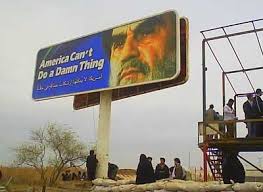
*****************************************************************************
A bit of background...
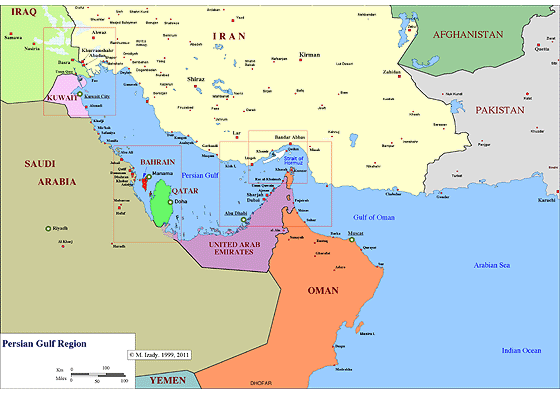
Forty years ago, on 1st February 1979 to be exact, the Ayatollah Ruhollah Khomeini flew into Tehran, Iran, on his return from late exile in France. The Shah, Mohammad Reza Pahlavi, had fled the country a couple of weeks previously, his power having been completely undermined during months of revolutionary activity throughout Iran. He was a narcissist who occupied the ‘Peacock Throne’ and revelled in the title (amongst others) of “Shahanshah”, meaning King of Kings, which says a lot about his perspective on life. He had ruled Iran since 1941, presiding over an oil-rich country increasingly riven by corruption, his dynasty’s grip enforced by the feared secret police, the Savak.
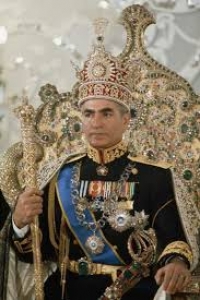
Shah Pahlavi
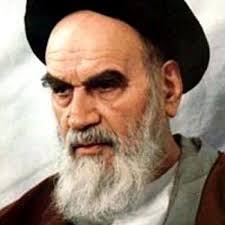
Ayotollah Khomeini
The Ayotollah, a man you could not imagine enjoying a good party, immediately set about forming a theocratic government, which was overtly hostile to the Western powers, in particular the United States. In November 1979, a group of Tehran students invaded the US embassy and took the occupants hostage. They were finally released in January 1981 following intense diplomatic efforts. Before this, in a bid to end the crisis, during April 1980 US President Jimmy Carter authorised operation Eagle Claw, which was devised to insert into the country American special forces who would raid the embassy and release the hostages.
Eagle Claw was a disaster. Eight Sea Stallion helicopters flying off from US aircraft carriers in the Persian Gulf were to land in the desert some 850 kms from Tehran. The plan was for them to refuel and to fly on with the special force personnel to secure an airfield about 80 kms outside the capital, from where the troops would travel in vehicles to the embassy, snatch the hostages, return to the airfield and be evacuated by air to friendly territory.
However, two of the helicopters suffered mechanical failure in dust storms en route to the first landing point, and a third collided on the ground with the refuelling tanker aircraft, killing eight US servicemen. The mission was aborted before it had properly got under way. (Hence the “America can’t do a damn thing” slogan.) The hostages were dispersed after this attempt, and were only finally released through the diplomatic effort.
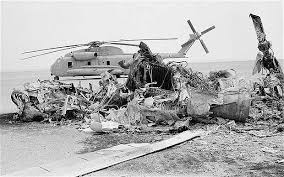
Disaster in the desert – operation Eagle Claw
In September 1980, Iraq invaded Iran. The resulting conflict was to last for eight years and claim hundreds of thousands of lives. At the end of it, each side declared victory. This was a mainly ground-based conflict, but escalating attacks were carried out against shipping in the Gulf (the “tanker war”), and also in the waterways leading to Iran’s main southern ports – Bandar Abbas and Bandar Shahpur, which had been renamed Bandar Imam Khomeini, and which was nearest to Tehran. It was at these ports that Iranian and foreign chartered ships endeavoured to land the imports, mainly foodstuffs such as wheat, corn and rice, but also steel and other building materials, and other cargoes vital to the war effort and indeed the country’s survival.
*******************************************************************************
It was against this background that I first went to Iran, in 1984, and my visits continued over the ensuing five years. I was, frankly, apprehensive on first going there and my feelings were not improved when I checked into what was then the Intercontinental Hotel in downtown Tehran and saw that slogan on the wall.
I had to stay several days in the hotel, awaiting the usual pass to get to where I was supposed to be working. (Bandar Imam Khomeini.) Pretty well all the Iranians I met were courteous, friendly and hospitable, as is the case, or so I’ve found, with people in most countries around the world. It seems invariably to be the authorities and the military who foul things up.
The hotel staff couldn’t have been friendlier or more helpful and, one sensed, they were not wholly sympathetic to the incumbent religious government. They all seemed to have been working there since before the revolution, and when they got used to me, the restaurant waiters would play little games at mealtimes; hence, a question as to whether I fancied red or white wine that night meant, respectively, Pepsi or Sprite. They told me about the revolution, when the hotel was invaded by a religious mob and all alcoholic drinks were hurled out of the upper windows to smash on the pavement below. Wine, spirits, beer, the lot. What a mess that must have made from fourteen floors up. While they told me these stories, the staff would shake their heads in regret, but their eyes would cut about to check who was listening.
******************************************************************************
The reason I was in Iran was that ships laden with import cargoes had reportedly been hit by Iraqi missiles in the Khor Musa Channel, which led to Bandar Imam Khomeini (BIK). The ships always proceeded in convoy, protected to some extent by the Iranian navy. Information as to the whereabouts and fate of ships which had been hit, and their crews, was sparse or non-existent, and the London marine underwriters who had appointed me needed to know something of the situation with their insured vessels.
To get to BIK, I had first to fly to the nearest domestic airport, and then get overland transport. Prior to boarding the domestic flight in Tehran, my and everyone else’s luggage was thoroughly dismantled and searched by the Revolutionary Guards (“Pasdaran”) manning security. My razor was confiscated, so from then on I went unshaven, thus blending in better with the bearded Pasdars.
BIK then was a pretty dreary place, situated at the head of the Persian Gulf. It was originally a railhead connecting with Tehran, and it had grown in importance if not in aesthetics as one of the principal ports. It seemed safe enough, although at night you could see a lot of anti-aircraft fire in the distance. The war front was about sixty kilometres distant to the west.
Over the next few days, I and other surveyors and assorted personnel went by launch down the Khor Musa channel to locate and inspect the ships which had been attacked. The three of interest to my particular principals, we found one by one, all anchored, with their accommodation burned out. The gossip was that the missiles used by the Iraqis were French Exocets, radar guided, or Chinese origin types equipped with heat-seeking guidance.
The ships had been all struck in their after structure, which included the engine room and some fuel tanks, crew cabins, messrooms and the navigation bridge, presenting the greatest radar target and which also emitted heat from the funnel. Consequently, crew (frequently Filipino) fatalities and burn injuries were numerous. Because the damage was aft, away from the cargo holds, the cargo itself was usually untouched and once the fires had been extinguished and the dead and injured evacuated, the Iranian authorities got busy towing the disabled ships to the port for discharge. I never found out the fate of the poor crews – BIK didn’t seem the sort of place that would host a state of the art hospital.
The authorities were extremely touchy about sending news of the ships’ whereabouts and condition, since this could have afforded the Iraqi enemy valuable intelligence. This was of course before the days of the common use of mobile phones, so I and all the others had to use a phone located in the local post office, which meant queuing for hours and then trying to get across at least minimal information down a dodgy line which was almost certainly tapped.
Prior to leaving London, I and my office colleagues had developed a simple code for use in just such circumstances: for instance, to say “It’s hot out here” meant the ship was burned out; “Feeling knackered” meant it was sunk, and so on. The ship’s location, expressed in degrees of latitude and longitude was read out as a cricket score, because we figured that cricket is so abstruse that no-one in Iran would understand that. (On one occasion, our London office manager, who was not the brightest star in the firmament, picked up the phone and when I said “I’ve got some cricket scores for you”, he said over the open line: “Oh yes, that’ll be the ship’s position then”, which gave me a minor heart attack.)
Some of the defensive measures adopted by the ship’s crews were interesting. One such was planned and constructed by the German officers of a particular bulk carrier. They were convinced that the incoming missiles were all heat-seeking, so had built a huge structure of scaffolding poles (God knows where they got them) around the funnel, connected to a nearby deck fire hydrant. The pipes had been drilled with hundreds of half-inch holes, so when the fire main was turned on, cooling water cascaded in all directions around the funnel, supposedly cancelling out the exhaust heat. Well, it was spectacular and they never got hit.
*******************************************************************************
I paid several visits to Iran over the next few years, on appointments which took me back to BIK, and the ports of Bushehr and Bandar Abbas. Over the years, the list of contacts built up and so did some degree of familiarity with the system and the politics. The overt hostility of the authorities toward the west waxed and waned, depending to a large extent on what the USA was up to.
One of the downsides was that at the end of a long day, you couldn’t get hold of a cold beer. However, folks being what they are, an active black market in smuggled and locally produced alcohol had developed. A peculiar feature of this market was the presence of the Armenian Christians, a powerful minority sect, who had applied to the Islamic Court for permission to manufacture sacramental wine, which, to everyone’s amazement, was granted. Consequently, the Armenians became the biggest producers of bootleg booze, which was available if you knew the right man.
During one of the ‘lenient’ periods, I flew into Tehran with a duty free bottle of scotch, in my bag, which I didn’t attempt to conceal. The customs officials turned it up and told me that import of alcohol was not allowed and that I could either turn it in against a receipt and claim it on the way out, or I could witness it being poured away. I couldn’t see, practically speaking, being able to reclaim the bottle, so opted for the latter course. I was taken to a side room, where the officers ceremoniously opened the cap and poured the contents down a metal sink set against the wall. I have been convinced ever since that there was a pipe leading from the plughole through the wall, and into a bucket that someone was holding on the other side.
What the customs did not twig was that some chocolates, a gift for a friend, that they found in my bag and waved through, were a liqueur selection. So I suppose it was a minor victory of sorts.
*********************************************************************************
On one trip I had to meet with a departmental manager of the National Iranian Tanker Company, to deal with a claim on one of their ships which was insured in London. It was a matter of negotiating a reasonable settlement.
It was an amicable meeting. We got a bit stuck on the settlement figure, but, he said, the thing could be resolved if I could assist him on something. I anticipated a veiled demand for a bribe of some sort, so was surprised when he told me that he took an evening English class at Tehran University and, since I was British, could I deliver a lecture to his students. This would certainly assist the insurance settlement process.
“Not a problem” said I, panicking slightly. “When would this be?”
“Tonight” he said, and I could have sworn there was a flicker of amusement in his eyes. And the subject?
“What about.....a short history of England?” he said. I was now sure that he was having trouble containing his laughter.
Having agreed to do it, I got away as soon as I decently could, and made a beeline for our agent’s office. I knew he had a reference library of sorts, and to my relief found an ancient encyclopedia. I sat down and composed a history of England from 1066 to the present day, all in two hours flat, to be delivered in the space of about twenty minutes.
That evening I was whisked by car to Tehran University and taken to the class, in which I delivered a somewhat incoherent and truncated lecture. The students looked a bit nonplussed, but as it turned out they mainly wanted to practice their English conversation. And a very charming bunch they were.
The upshot was that the insurance claim was amicably settled, and I can state with absolute truth, should anyone ask, that I have lectured at Tehran University.
********************************************************************************
Tehran traffic and the congestion and pollution it caused could vie for the world record. Taxis were hard to flag down and those that stopped invariably had passengers already seated in them. You saw little knots of pedestrians clutched together in the middle of the road, surrounded by swerving cars, desperately shouting and waving at passing cabs. Our agent told me in all seriousness (well, I think it was – Iranians of the more secular persuasion have a wicked sense of humour) that prior to the revolution, an American study had concluded that the traffic congestion was down to too many vehicles carrying messages from one office to the other, because the landline phone system didn’t function properly. Ergo, if the phone problems could be fixed then that would cure the traffic jams.
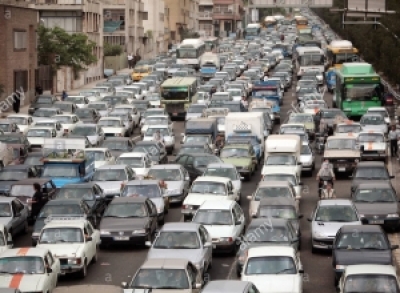
Tehran traffic
Looking at this recent stock photo of Tehran, it looks as though the advent of mobile phones hasn’t done the trick, so that American study must have been flawed. One thing I’m convinced of is that Jimmy Carter’s attempted rescue of the American hostages would never have worked because the special forces’ convoy would have got irretrievably clogged up in traffic.
*********************************************************************************
My last visit to Iran was in 1989. The preceding year had seen the war with Iraq peter out with neither side having gained much if anything, but with a massive drain on lives and material. Since that conflict, as we all know, the Iranian government has turned its attention to foreign intervention in Syria and latterly in its old enemy Iraq. Iran, principally Shia Muslim, is locked in bitter rivalry for regional dominance with its Sunni Muslim neighbour, Saudi Arabia. The destruction of Israel remains official policy. The everyday lives of the ordinary people have been immeasurably affected for the worse by the haemorrhaging of resources to military adventures, and by international sanctions that bite very deeply indeed. There have been street protests and riots, savagely put down by the Revolutionary Guards whose influence over the years extends to whole swathes of domestic industries and interests through shell company ownership.
As far as I can see, life for the citizens has not improved since I was there, and no doubt in very many ways it has got worse. The people I met and engaged with, who became friends in many cases, were well educated, courteous, helpful and good-humoured; but it’s a salutary thought that they have now been supplanted by a generation that, even if born in the very year of the Shah’s abdication and the revolution, is now middle aged and has experienced nothing but the authoritarian government instituted by Ayatollah Khomeini all those decades ago.
Brian Cushing
18 February 2019







Make A Comment
Comments (1)